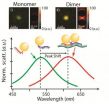(Press-News.org) Alexandria, Va. – On a muggy day in mid-July 2009, a lone seven-story condominium complex northwest of Kobe, Japan, was violently shaken by an earthquake. Onlookers watched the 23-unit, wood-frame tower sway and bounce while, inside the building, furniture toppled and plates clattered to the floor. No one was hurt during the highly localized event and there was only minimal damage, in part because the building's wooden skeleton had been augmented to better resist earthquake shaking, but also because the whole event — from the seismicity to the partially furnished building — was just a test.
It was the largest seismic experiment ever conducted on a full-size building, and it was carried out on the world's biggest earthquake-simulating shake table. Several other research facilities also have their own large shake tables, on which engineers are constructing and shaking full-size buildings to learn how to make them safer during earthquakes.
Learn more about the massive shake tables that make full-scale seismic testing a reality in the May issue of EARTH Magazine: http://bit.ly/1rkA8cX.
For more stories about the science of our planet, check out EARTH Magazine online or subscribe at http://www.earthmagazine.org. The May issue, now available on the digital newsstand, features stories on how GPS has revolutionized seismic research, how mercury pollution in the Arctic is linked to spring sea-ice cycles, and how much methane scientists have found occurring naturally in New York groundwater, plus much, much more.
INFORMATION:
Keep up to date with the latest happenings in Earth, energy and environment news with EARTH magazine online at: http://www.earthmagazine.org/. Published by the American Geosciences Institute, EARTH is your source for the science behind the headlines.
The American Geosciences Institute is a nonprofit federation of 50 geoscientific and professional associations that represents more than 250,000 geologists, geophysicists and other earth scientists. Founded in 1948, AGI provides information services to geoscientists, serves as a voice of shared interests in the profession, plays a major role in strengthening geoscience education, and strives to increase public awareness of the vital role the geosciences play in society's use of resources, resiliency to natural hazards, and interaction with the environment.
EARTH Magazine: Faking quakes at full scale
Giant shake tables simulate earthquakes to make buildings safer
2014-04-23
ELSE PRESS RELEASES FROM THIS DATE:
Some astronauts at risk for cognitive impairment, animal studies suggest
2014-04-23
Johns Hopkins scientists report that rats exposed to high-energy particles, simulating conditions astronauts would face on a long-term deep space mission, show lapses in attention and slower reaction times, even when the radiation exposure is in extremely low dose ranges.
The cognitive impairments — which affected a large subset, but far from all, of the animals — appear to be linked to protein changes in the brain, the scientists say. The findings, if found to hold true in humans, suggest it may be possible to develop a biological marker to predict sensitivity to radiation's ...
Gold nanoparticles help target, quantify breast cancer segments in a living cell
2014-04-23
WEST LAFAYETTE, Ind. - Purdue University researchers have developed a way to detect and measure cancer levels in a living cell by using tiny gold particles with tails of synthetic DNA.
A team led by Joseph Irudayaraj, professor of agricultural and biological engineering, used gold nanoparticles to target and bind to fragments of genetic material known as BRCA1 messenger RNA splice variants, which can indicate the presence and stage of breast cancer. The number of these mRNA splice variants in a cell can be determined by examining the specific signal that light produces ...
Study identifies enzymes that help fix cancer-causing DNA defects
2014-04-23
Purdue University researchers have identified an important enzyme pathway that helps prevent new cells from receiving too many or too few chromosomes, a condition that has been directly linked to cancer and other diseases.
Mark Hall, associate professor of biochemistry, found that near the end of cell division, the enzyme Cdc14 activates Yen1, an enzyme that ensures any breaks in DNA are fully repaired before the parent cell distributes copies of the genome to daughter cells. This process helps safeguard against some of the most devastating genome errors, including the ...
A key to enjoying massive online photo files may be giving up some control
2014-04-23
PITTSBURGH—The ability of individuals to store and instantly access thousands of their photos online has become a commonplace luxury, but the sheer size of these archives can be intimidating. Researchers at Carnegie Mellon University and Microsoft Research Cambridge, UK, have found people might actually enjoy their collections more by giving up a bit of control and learning to wait.
Their 14-month study showed that people reflected more on past events and developed a renewed interest in their online photos when a device called Photobox would randomly print four or five ...
AGU: Odds of storm waters overflowing Manhattan seawall up 20-fold, new study shows
2014-04-23
WASHINGTON, D.C. -- Maximum water levels in New York harbor during major storms have risen by nearly two and a half feet since the mid-1800s, making the chances of water overtopping the Manhattan seawall now at least 20 times greater than they were 170 years ago, according to a new study. Whereas sea-level rise, which is occurring globally, has raised water levels along New York harbor by nearly a foot and a half since the mid-19th century, the research shows that the maximum height of the city's "once-in-10-years" storm tide has grown additionally by almost a foot in that ...
Study finds long-term survival of human neural stem cells transplanted into primate brain
2014-04-23
Putnam Valley, NY. (Apr. 23 2014) – A team of researchers in Korea who transplanted human neural stem cells (hNSCs) into the brains of nonhuman primates and assessed cell survival and differentiation after 22 and 24 months found that the hNSCs had differentiated into neurons at 24 months and did not cause tumors.
The study will be published in a future issue of Cell Transplantation but is currently freely available on-line as an unedited early e-pub at: http://www.ingentaconnect.com/content/cog/ct/pre-prints/content-ct1117Antonucci2.
The hNSCs were labeled with magnetic ...
Scientists identify source of mysterious sound in the Southern Ocean
2014-04-23
Scientists have conclusive evidence that the source of a unique rhythmic sound, recorded for decades in the Southern Ocean and called the "bio-duck," is the Antarctic minke whale (Balaenoptera bonaerensis). First described and named by submarine personnel in the 1960s who thought it sounded like a duck, the bio-duck sound has been recorded at various locations in the Southern Ocean, but its source has remained a mystery, until now.
In February 2013, an international team of researchers deployed acoustic tags on two Antarctic minke whales in Wilhelmina Bay off the western ...
Autologous stem cell therapy improves motor function in chronic stroke victims
2014-04-23
Putnam Valley, NY. (Apr. 23, 2014) – People who have had a stroke, often suffer motor deficits with little potential to restore neurological function. However, a study conducted in Taiwan, that will be published in a future issue of Cell Transplantation, but is currently freely available on-line as an unedited early e-pub at: http://www.ingentaconnect.com/content/cog/ct/pre-prints/content-ct1168Chen, has found that when one group of stroke victims had their own peripheral blood stem cells (PBSCs) injected directly into the brain and a similar group did not, those who received ...
Too many chefs: Smaller groups exhibit more accurate decision-making
2014-04-23
The trope that the likelihood of an accurate group decision increases with the abundance of brains involved might not hold up when a collective faces a variety of factors — as often happens in life and nature. Instead, Princeton University researchers report that smaller groups actually tend to make more accurate decisions while larger assemblies may become excessively focused on only certain pieces of information.
The findings present a significant caveat to what is known about collective intelligence, or the "wisdom of crowds," wherein individual observations — even ...
Community-based weight loss program aids diabetes management
2014-04-23
Weight loss and control of blood sugar can reduce the risk of complications in patients with diabetes but this is difficult for many to achieve. A University of California, San Diego School of Medicine randomized controlled trial of obese adults with type 2 diabetes suggests that participants enrolled in a community-based structured weight loss program are able to shed more pounds, improve blood sugar control and reduce or eliminate insulin use and other medications compared to a control group.
"Support and a tailored lifestyle intervention have been shown to reduce cardiovascular ...
LAST 30 PRESS RELEASES:
Ochsner MD Anderson uses groundbreaking TIL therapy to treat advanced melanoma in adults
A heatshield for ‘never-wet’ surfaces: Rice engineering team repels even near-boiling water with low-cost, scalable coating
Skills from being a birder may change—and benefit—your brain
Waterloo researchers turning plastic waste into vinegar
Measuring the expansion of the universe with cosmic fireworks
How horses whinny: Whistling while singing
US newborn hepatitis B virus vaccination rates
When influencers raise a glass, young viewers want to join them
Exposure to alcohol-related social media content and desire to drink among young adults
Access to dialysis facilities in socioeconomically advantaged and disadvantaged communities
Dietary patterns and indicators of cognitive function
New study shows dry powder inhalers can improve patient outcomes and lower environmental impact
Plant hormone therapy could improve global food security
A new Johns Hopkins Medicine study finds sex and menopause-based differences in presentation of early Lyme disease
Students run ‘bee hotels’ across Canada - DNA reveals who’s checking in
SwRI grows capacity to support manufacture of antidotes to combat nerve agent, pesticide exposure in the U.S.
University of Miami business technology department ranked No. 1 in the nation for research productivity
Researchers build ultra-efficient optical sensors shrinking light to a chip
Why laws named after tragedies win public support
Missing geomagnetic reversals in the geomagnetic reversal history
EPA criminal sanctions align with a county’s wealth, not pollution
“Instead of humans, robots”: fully automated catalyst testing technology developed
Lehigh and Rice universities partner with global industry leaders to revolutionize catastrophe modeling
Engineers sharpen gene-editing tools to target cystic fibrosis
Pets can help older adults’ health & well-being, but may strain budgets too
First evidence of WHO ‘critical priority’ fungal pathogen becoming more deadly when co-infected with tuberculosis
World-first safety guide for public use of AI health chatbots
Women may face heart attack risk with a lower plaque level than men
Proximity to nuclear power plants associated with increased cancer mortality
Women’s risk of major cardiac events emerges at lower coronary plaque burden compared to men
[Press-News.org] EARTH Magazine: Faking quakes at full scaleGiant shake tables simulate earthquakes to make buildings safer



